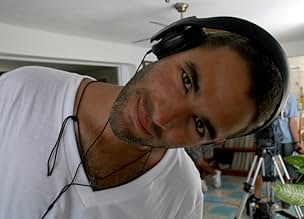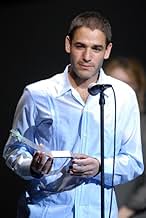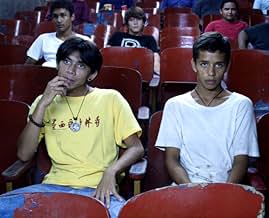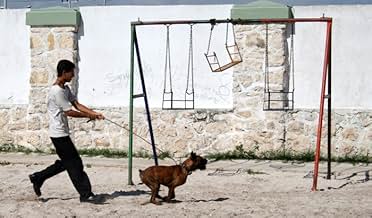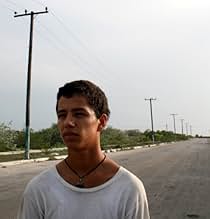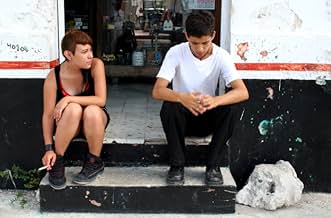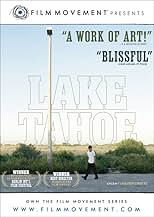IMDb रेटिंग
6.6/10
1.8 हज़ार
आपकी रेटिंग
अपनी भाषा में प्लॉट जोड़ेंA story of a teenager and the strange events that take place in his small town.A story of a teenager and the strange events that take place in his small town.A story of a teenager and the strange events that take place in his small town.
- निर्देशक
- लेखक
- स्टार
- पुरस्कार
- 10 जीत और कुल 9 नामांकन
फ़ीचर्ड समीक्षाएं
"Lake Tahoe" is a wonderful, placid drama about a boy's strange encounters as he, externally, seeks help to fix his car, but, more to the point, as he internally seeks something (to escape, to cope, to get reassurance) after the death of his father. He seems willing to befriend the people he meets as long as he chooses the terms himself, and as long as performing favors or going out with friends gets him away from home or anything that would tie him to his town. Don't expect action in this little personal odyssey (taking place over the course of a single day). The viewer gets a chance to focus as intensely on the day's weird experiences as Juan (a teenager experiencing his father's death) does. Even if only for as long as Juan searches for answers.
Fernando Eimbcke's film is shot and takes place in Puerto Progreso, Yucatán (Mexico), a mostly vacant, small town. Juan (Diego Cataño) meets a couple auto mechanics and a clueless auto receptionist, and checks in with his little brother and his grieving mother (she's locked herself in a bathroom for much of the movie). The viewers mainly see him walk across the screen for several long shots, some of which recur as he retreads his path this way and that way.
Nearly every scene is shot with motionless camera angles, a huge difference from many movies in which the camera constantly moves, zooms, or shakes to the point of nausea. The effect of this odd camera work is to make the whole background become part of the film. Patient viewers may get absorbed in the movie, especially as all the individual shots start adding up to a meaningful story. Most of the eventful action takes place off camera, during frequent cut to blacks (sometimes with important sounds in the background, plain natural-musical sounds, or silence). The film has a sense of immersion and simplicity in which the viewer fills the missing fragments with sound or their imagination.
We aren't given much information about where he wants to go or where he was going when he crashed his family's car into a pole (on the side of a low traffic road). How did he crash it in such a seemingly straight and hazard-less area? The point is probably that Juan is just as uncertain as the viewer. He has no ready explanation for the car crash, but perhaps he was trying to get away or somehow escape his intense feelings after his loss. We only learn about any of these feelings until a good way into the movie.
He seems mostly passive at first, just taking in the oddly tangential actions of the people he meets, but he intermittently prods them to hurry. Juan seems stuck between a desire to get out of these places he visits (to always find another auto mechanic) and a strange fixation on experiencing the little quirks of the people he meets. His motive to get away usually wins.
Juan often says "no" or shakes his head in the negative to requests. Juan meets an elderly auto mechanic, Don Heber (played by Hector Herrera), who makes the boy wait as he eats breakfast with his dog, Sica. He goes on to the next person after Don fails to help him fix his car. Juan waits even longer for a young mechanic, David (Juan Carlos Lara II), an energetic follower of martial arts who is apt to break into a series of kicks and arm movements (turning martial arts moves into a sort of dance) and Bruce Lee reenactments. As he hangs out with Lucia (Daniela Valentine), the receptionist at David's auto shop, she starts to trust him and asks him to babysit her infant while she goes to a concert. He declines several times.
Many such encounters play out. David's mother wants him to comment on a passage from the Bible (he sneaks out of the house), Don wants him to walk his dog (Juan accepts only very reluctantly, loses the dog, and then childishly goes on to the next auto mechanic), and David wants him to go to a Bruce Lee movie (he declines at first).
He only accepts any of these offers after he has time to think them over and make his own choice, or perhaps only after he gets home and finds he wants to get away again (perhaps it has to do with the place reminding him of his father). And then these requests for favors and friendship suddenly become the perfect thing to go do.
An excellent, climactic scene takes place between Jaun and Lucia after she isn't able to go to a concert. Jaun doesn't need to stay on as a babysitter and seems intent to leave, but, again, he seems needy at the same time. Lucia takes advantage of his indecision with a sexual advance (they take off their shirts), but he uses it as a cathartic chance for release and ends up crying on her. Probably not what she had in mind, but a very well done scene in minimal, natural light. The rest of the film is also shot with just natural lighting.
Juan is an interesting case study in loss (partly autobiographical by the director) in that it leaves Juan's motives mysterious for the viewer to figure out. Juan tries to escape from everything that holds him in place. But he overcomes such desires in a rush of emotional release. The film leaves me with the feeling that the journey was much more interesting than any likely consequence to it. The post emotional release period sort of kills all the meaningful possibilities and mysterious encounters that took place for most of the film.
Fernando Eimbcke's film is shot and takes place in Puerto Progreso, Yucatán (Mexico), a mostly vacant, small town. Juan (Diego Cataño) meets a couple auto mechanics and a clueless auto receptionist, and checks in with his little brother and his grieving mother (she's locked herself in a bathroom for much of the movie). The viewers mainly see him walk across the screen for several long shots, some of which recur as he retreads his path this way and that way.
Nearly every scene is shot with motionless camera angles, a huge difference from many movies in which the camera constantly moves, zooms, or shakes to the point of nausea. The effect of this odd camera work is to make the whole background become part of the film. Patient viewers may get absorbed in the movie, especially as all the individual shots start adding up to a meaningful story. Most of the eventful action takes place off camera, during frequent cut to blacks (sometimes with important sounds in the background, plain natural-musical sounds, or silence). The film has a sense of immersion and simplicity in which the viewer fills the missing fragments with sound or their imagination.
We aren't given much information about where he wants to go or where he was going when he crashed his family's car into a pole (on the side of a low traffic road). How did he crash it in such a seemingly straight and hazard-less area? The point is probably that Juan is just as uncertain as the viewer. He has no ready explanation for the car crash, but perhaps he was trying to get away or somehow escape his intense feelings after his loss. We only learn about any of these feelings until a good way into the movie.
He seems mostly passive at first, just taking in the oddly tangential actions of the people he meets, but he intermittently prods them to hurry. Juan seems stuck between a desire to get out of these places he visits (to always find another auto mechanic) and a strange fixation on experiencing the little quirks of the people he meets. His motive to get away usually wins.
Juan often says "no" or shakes his head in the negative to requests. Juan meets an elderly auto mechanic, Don Heber (played by Hector Herrera), who makes the boy wait as he eats breakfast with his dog, Sica. He goes on to the next person after Don fails to help him fix his car. Juan waits even longer for a young mechanic, David (Juan Carlos Lara II), an energetic follower of martial arts who is apt to break into a series of kicks and arm movements (turning martial arts moves into a sort of dance) and Bruce Lee reenactments. As he hangs out with Lucia (Daniela Valentine), the receptionist at David's auto shop, she starts to trust him and asks him to babysit her infant while she goes to a concert. He declines several times.
Many such encounters play out. David's mother wants him to comment on a passage from the Bible (he sneaks out of the house), Don wants him to walk his dog (Juan accepts only very reluctantly, loses the dog, and then childishly goes on to the next auto mechanic), and David wants him to go to a Bruce Lee movie (he declines at first).
He only accepts any of these offers after he has time to think them over and make his own choice, or perhaps only after he gets home and finds he wants to get away again (perhaps it has to do with the place reminding him of his father). And then these requests for favors and friendship suddenly become the perfect thing to go do.
An excellent, climactic scene takes place between Jaun and Lucia after she isn't able to go to a concert. Jaun doesn't need to stay on as a babysitter and seems intent to leave, but, again, he seems needy at the same time. Lucia takes advantage of his indecision with a sexual advance (they take off their shirts), but he uses it as a cathartic chance for release and ends up crying on her. Probably not what she had in mind, but a very well done scene in minimal, natural light. The rest of the film is also shot with just natural lighting.
Juan is an interesting case study in loss (partly autobiographical by the director) in that it leaves Juan's motives mysterious for the viewer to figure out. Juan tries to escape from everything that holds him in place. But he overcomes such desires in a rush of emotional release. The film leaves me with the feeling that the journey was much more interesting than any likely consequence to it. The post emotional release period sort of kills all the meaningful possibilities and mysterious encounters that took place for most of the film.
I watched this movie at the Berlinale (Berlin Film Festival) earlier this year and the movie struck a chord with me. Not the theme/story of the movie, but the way it was filmed and (dare I say?) edited. For some the word edited might be as far a stretch as to call this movie fast moving. It'll even be an understatement to say it's slow moving, so be warned!
The shots are long (watching a character moving from the left screen edge to the right screen edge and beyond might be tough for some viewers. But after the initial resent at the beginning of the movie and if you can let yourself indulge the tranquility of the film, you might enjoy it! Just don't expect anything fancy or anything major revealing (plot twists etc.) and you'll have a nice, quiet and pleasant viewing. While it dares to be different (as some other movies, that I have voted in a more bad way), this does not only promise us something, but it delivers.
The shots are long (watching a character moving from the left screen edge to the right screen edge and beyond might be tough for some viewers. But after the initial resent at the beginning of the movie and if you can let yourself indulge the tranquility of the film, you might enjoy it! Just don't expect anything fancy or anything major revealing (plot twists etc.) and you'll have a nice, quiet and pleasant viewing. While it dares to be different (as some other movies, that I have voted in a more bad way), this does not only promise us something, but it delivers.
In Fernando Eimbcke's peculiar film, a young man crashes his car in the sleepy Mexican town where his family lives. No-one seems interested in fixing it. Eventually, someone does. His engagements with the various oddballs he meets while trying to repair it are set against the backdrop of the recent death of his father. And that's it. The film seems part a meditation on cosmic loneliness, and part a satire on national decay, but I've rarely seen a film with so little dialogue and action: each scene is separated by a black interlude, and much of the plot is implied in the gaps, rather than shown. Eimbcke succeeds in creating a mood, but the absence of any conventional storytelling imperative makes it a sparse experience. It feels more like a proof of concept than a completely finished movie.
Let us get all our facts and views clear about this quasi Avant-Garde Mexican film.Fernando Eimbecke's second film "Lake Tahoe" is not at all an existentialist film.It is a film of absurd ideas involving numerous boisterous undertones but not in the same tradition as that of Monty Python type of films.The viewers' interest in the film is generated right from the beginning as it takes place in some obscure sleepy town in Mexico where hardly anybody could be seen on the streets.It appears as if a lost ghost town is being portrayed on the screen.Those who look for perfection in the form of innovative cinematography would not be deceived as "Lake Tahoe" features some of the most well executed, well planned camera angels which would even put late Nestor Almendros to shame.Fernando Eimbecke is a prolific young director but it is rather unfortunate that he has been compared to the great master of cinema Luis Bunuel.He is just two films old and it is easily evident that he has a golden future ahead of him but such a tempting comparison in the early part of a young person's career might turn out to be counter productive.A final word of warning.Those who are looking for a meaningful story will be highly disappointed.This is not hard to swallow as Godard uncle stated a very long time ago that films should have a beginning, a middle, and an end... but not necessarily in that order.
Teen Juan (Diego Cataño) crashes the family car into a pole. He searches the quiet streets for help to fix the car. He encounters paranoid mechanic Don Heber and his dog. Then there is young mother Lucia. And there is David the young mechanic who is obsessed with kung fu.
This is extremely slow and minimalist. It is a Mexican indie. It's visually bright like a sleepy summer day. I'm fine with some long artistic shots but this has way too much of them. The movie is only an hour and a half. It feels like half of it has nothing in it. The other half has very quiet acting going on which doesn't showcase any big acting skills. It is an art film to be sure. I just never felt any excitement for this movie even when the backstory is revealed.
This is extremely slow and minimalist. It is a Mexican indie. It's visually bright like a sleepy summer day. I'm fine with some long artistic shots but this has way too much of them. The movie is only an hour and a half. It feels like half of it has nothing in it. The other half has very quiet acting going on which doesn't showcase any big acting skills. It is an art film to be sure. I just never felt any excitement for this movie even when the backstory is revealed.
टॉप पसंद
रेटिंग देने के लिए साइन-इन करें और वैयक्तिकृत सुझावों के लिए वॉचलिस्ट करें
विवरण
- रिलीज़ की तारीख़
- कंट्री ऑफ़ ओरिजिन
- भाषाएं
- इस रूप में भी जाना जाता है
- Hồ Tahoe
- फ़िल्माने की जगहें
- उत्पादन कंपनियां
- IMDbPro पर और कंपनी क्रेडिट देखें
बॉक्स ऑफ़िस
- दुनिया भर में सकल
- $2,19,244
- चलने की अवधि
- 1 घं 29 मि(89 min)
- रंग
- पक्ष अनुपात
- 2.35 : 1
इस पेज में योगदान दें
किसी बदलाव का सुझाव दें या अनुपलब्ध कॉन्टेंट जोड़ें


